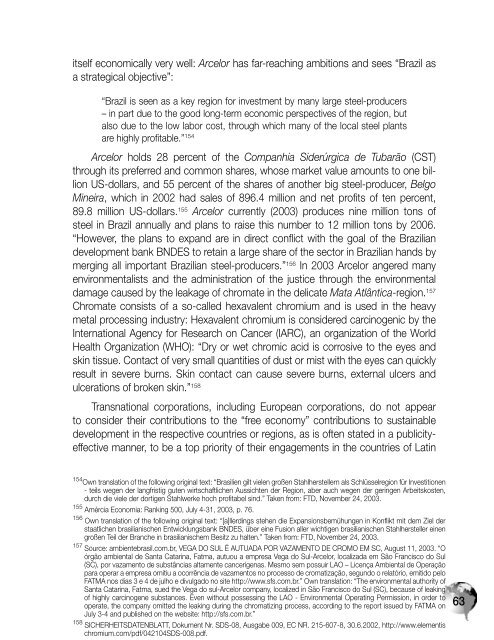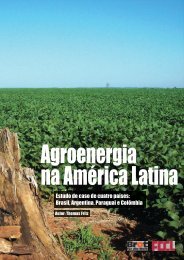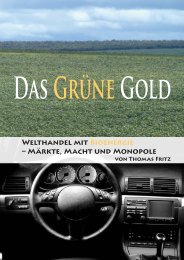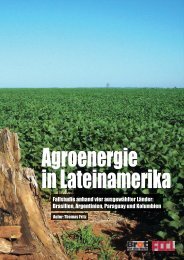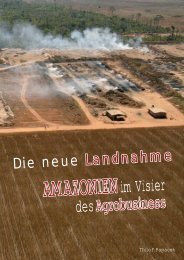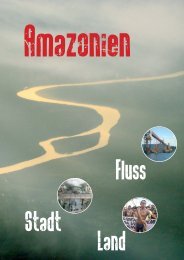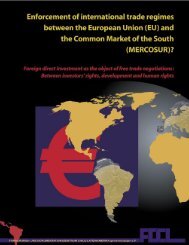Download - FDCL
Download - FDCL
Download - FDCL
You also want an ePaper? Increase the reach of your titles
YUMPU automatically turns print PDFs into web optimized ePapers that Google loves.
itself economically very well: Arcelor has far-reaching ambitions and sees “Brazil as<br />
a strategical objective”:<br />
“Brazil is seen as a key region for investment by many large steel-producers<br />
– in part due to the good long-term economic perspectives of the region, but<br />
also due to the low labor cost, through which many of the local steel plants<br />
are highly profitable.” 154<br />
Arcelor holds 28 percent of the Companhia Siderúrgica de Tubarão (CST)<br />
through its preferred and common shares, whose market value amounts to one billion<br />
US-dollars, and 55 percent of the shares of another big steel-producer, Belgo<br />
Mineira, which in 2002 had sales of 896.4 million and net profits of ten percent,<br />
89.8 million US-dollars. 155 Arcelor currently (2003) produces nine million tons of<br />
steel in Brazil annually and plans to raise this number to 12 million tons by 2006.<br />
“However, the plans to expand are in direct conflict with the goal of the Brazilian<br />
development bank BNDES to retain a large share of the sector in Brazilian hands by<br />
merging all important Brazilian steel-producers.” 156 In 2003 Arcelor angered many<br />
environmentalists and the administration of the justice through the environmental<br />
damage caused by the leakage of chromate in the delicate Mata Atlântica-region. 157<br />
Chromate consists of a so-called hexavalent chromium and is used in the heavy<br />
metal processing industry: Hexavalent chromium is considered carcinogenic by the<br />
International Agency for Research on Cancer (IARC), an organization of the World<br />
Health Organization (WHO): “Dry or wet chromic acid is corrosive to the eyes and<br />
skin tissue. Contact of very small quantities of dust or mist with the eyes can quickly<br />
result in severe burns. Skin contact can cause severe burns, external ulcers and<br />
ulcerations of broken skin.” 158<br />
Transnational corporations, including European corporations, do not appear<br />
to consider their contributions to the “free economy” contributions to sustainable<br />
development in the respective countries or regions, as is often stated in a publicityeffective<br />
manner, to be a top priority of their engagements in the countries of Latin<br />
154 Own translation of the following original text: “Brasilien gilt vielen großen Stahlherstellern als Schlüsselregion für Investitionen<br />
- teils wegen der langfristig guten wirtschaftlichen Aussichten der Region, aber auch wegen der geringen Arbeitskosten,<br />
durch die viele der dortigen Stahlwerke hoch profitabel sind.” Taken from: FTD, November 24, 2003.<br />
155 Amércia Economia: Ranking 500, July 4-31, 2003, p. 76.<br />
156 Own translation of the following original text: “[a]llerdings stehen die Expansionsbemühungen in Konflikt mit dem Ziel der<br />
staatlichen brasilianischen Entwicklungsbank BNDES, über eine Fusion aller wichtigen brasilianischen Stahlhersteller einen<br />
großen Teil der Branche in brasilianischem Besitz zu halten.” Taken from: FTD, November 24, 2003.<br />
157 Source: ambientebrasil.com.br, VEGA DO SUL É AUTUADA POR VAZAMENTO DE CROMO EM SC, August 11, 2003. “O<br />
órgão ambiental de Santa Catarina, Fatma, autuou a empresa Vega do Sul-Arcelor, localizada em São Francisco do Sul<br />
(SC), por vazamento de substâncias altamente cancerígenas. Mesmo sem possuir LAO – Licença Ambiental de Operação<br />
para operar a empresa omitiu a ocorrência de vazamentos no processo de cromatização, segundo o relatório, emitido pelo<br />
FATMA nos dias 3 e 4 de julho e divulgado no site http://www.sfs.com.br.” Own translation: “The environmental authority of<br />
Santa Catarina, Fatma, sued the Vega do sul-Arcelor company, localized in São Francisco do Sul (SC), because of leaking<br />
of highly carcinogene substances. Even without possessing the LAO - Environmental Operating Permission, in order to<br />
operate, the company omitted the leaking during the chromatizing process, according to the report issued by FATMA on<br />
July 3-4 and published on the website: http://sfs.com.br.”<br />
158 SICHERHEITSDATENBLATT, Dokument Nr. SDS-08, Ausgabe 009, EC NR. 215-607-8, 30.6.2002, http://www.elementis<br />
chromium.com/pdf/042104SDS-008.pdf.<br />
63


